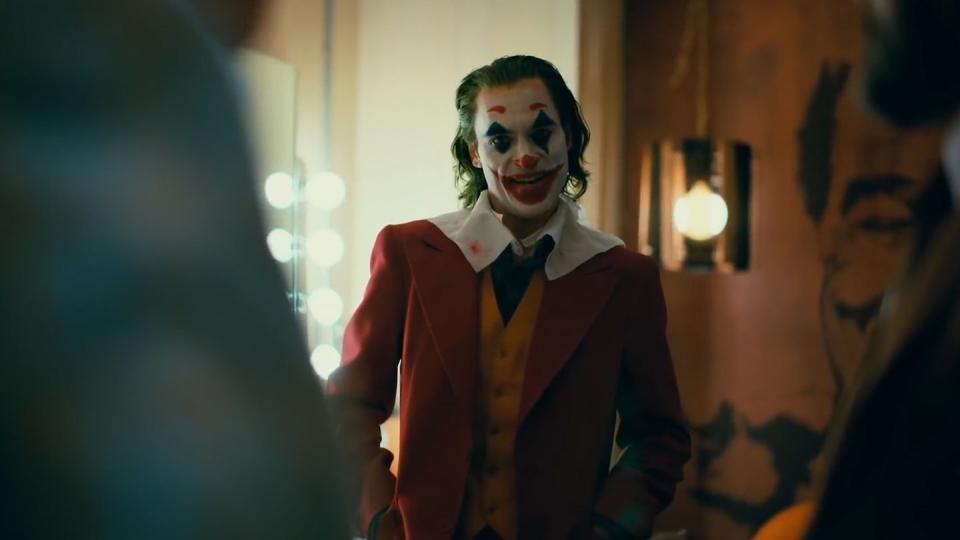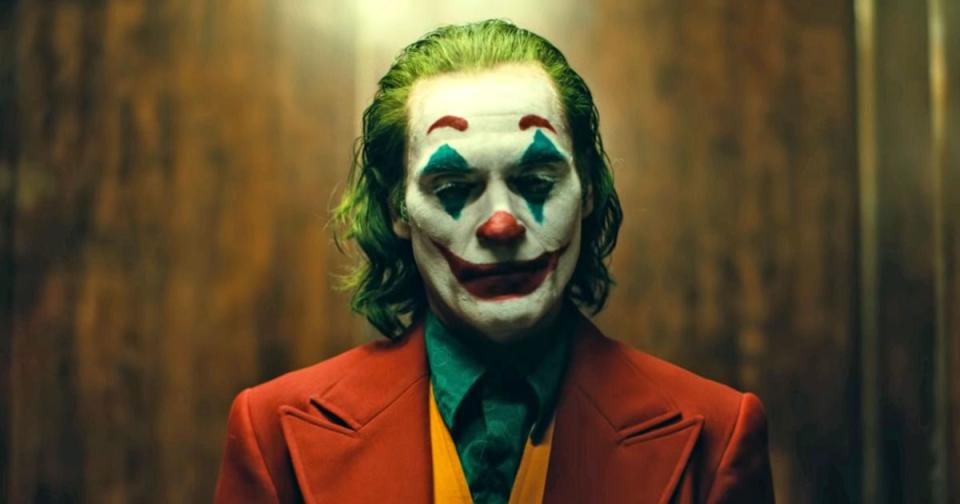'Joker' Winning Best Picture At the Oscars Would Be the Ultimate Punchline
The only joy I got from the release of Joker in October came from the memes. There’s the “For those who didn’t catch the reference,” which mocks the stupidly blunt homage that Todd Phillips’s supervillain movie pays to Heath Ledger’s Joker. There were the many loops of Joaquin Phoenix dancing on those Bronx steps set to different music (see also: mini dancing Joker stoked that mom made chicken nuggies). But perhaps my favorite is the image of Joker, full make-up, wearing a photoshopped Nike windbreaker staring dead-faced into a mirror with a caption like “she prolly went to sleep early it’s whatever.” Watching internet memelords assign trivial hilarious meaning to a hollow film that takes itself so seriously is a true delight.
I know the Internet does this with everything—from Baby Yoda to the Tesla truck—but Joker lends itself more perfectly than usual to absurdist humor because as a piece of cinema, it’s something of a blank slate. Joker introduces dozens of thesis statements, but never actually makes any sort of coherent point. It has no clear stance or point of view or message. It positions itself as a character study—a drama making a statement about violent men, about evil—but this is about as powerful as putting clown makeup on a mannequin. Among the themes that the film touches on but reaches no conclusion are: Mental health, child abuse, elder abuse, class warfare, racism, the power of media/entertainment, the subjectivity of comedy (?), mob mentality, incels, domestic terrorists, white male anger, gun violence, gun control, the persecution of clowns in America. Rather than tell a story that addresses one or three or all of these topics, Joker simply throws them into the void without comment or analysis, like a high school essay that a student started but didn’t bother to finish.
Like the Joker himself, this is a movie that seemingly only exists to cause chaos, throwing out controversial topics just to stir the pot. Me, I prefer the memes, the best of which turn Joker into a whiny, privileged internet teen who just wishes he was making millions as a YouTube star.
Joker has 11 Oscar nominations—the most of any other movie this year—including for Best Picture and Best Director. That fact alone rightfully pissed off a lot of critics. Why nominate Phillips for Best Director for making a derivative film that repackages a couple of Martin Scorsese movies when Greta Gerwig deftly adapted a 200-year-old story for a new generation? It’s an absolutely valid argument that I’ll save for another time. That’s because the sad truth is, Joker is the Oscar nomination we deserve. The nomination is itself a chaotic evil, the type the Academy of Motion Picture Picture Arts and Sciences loves to embrace. Joker has been called the Green Book of superhero movies, and that’s probably the best comparison to make in award season terms. And Joker is the Oscar nomination that mass movie going audiences deserve—it’s a massive box office hit that has proven to be the successful type of film that succeeds in its reliance on viewers to not dig one layer below its surface.
Joker is a careless movie with little respect for its audience. It’s a movie that thinks very highly of itself and very little of society as a whole. And given its success and long list of prestigious nominations and the state of the world, it's easy to feel as hopeless and nihilistic. Joker will win best picture, because that’s the most cosmic joke of all, and perfect for this moment in history.

I think of the Joker a lot like Trump’s Twitter feed. The President of the United States often uses his platform to send out memes, gifs, or images that will do things like call for violence against journalists or use anti-semitic symbolism. Trump does this as an agent of chaos, and is protected by the careless vagaries of his messaging. Without comment, a gif of the CNN logo getting viciously body-slammed looks like a call for violence against journalists. “Good people on both sides” was widely read as a defense of white supremacy. Throwing paper towels at Puerto Ricans who just suffered thousands of deaths and billions of dollars in damage can be seen as a gesture of incredulous disrespect. The same could be said about Joker. One thread throughout the film involves the masses rallying behind Joker, because he’s seen as a hero fighting against the grip of capitalism and the tyranny of the wealthy. But the Joker is really a heartless killer who cares nothing about classism. Given this situation isn’t ever resolved and no comment is ever made on the topic, the narrative can be taken as either a condemnation of low-income outrage or a support of it. By simply introducing the idea that Joker only committed acts of extreme violence because he’s mentally ill, seems to excuse the actions of violent white men and push the incorrect assumption that mentally ill people are likely to commit violent crimes. By visually evoking real-world racial violence and cases of the Central Park Five and Bernhard Goetz, without any social commentary, its point can be seriously misconstrued.
Donald Trump uses the platform of the highest office in the land to share dangerous, half-baked messaging with millions of people around the globe. Joker has an equally massive platform as a superhero movie, a genre which is by far the most dominant in American cinema. Comic book movies represent 25 percent of the domestic marketplace. It’s difficult for major studios to get audiences to see anything that’s not a tentpole property like a Marvel or DC movie. And Phillips and Warner Bros. know this well. So, they took a superhero character and used that to get audiences into the theater to see a film that wants to be a deep character-driven narrative drama. Phoenix himself didn’t want to make a superhero movie. He’s been clear on this. He wanted to star in a gritty character study. And in that sense Joker is something of a bait and switch. Joker is the seventh highest grossing movie of 2019. Certainly this would not have been the case if it wasn’t peripherally connected to a comic book property. If this had been an indie movie starring Joaquin Phoenix, it would have been released in eight theaters to average-to-negative reviews and no one would have seen it. Phoenix’s fantastic You Were Never Really Here, which has something of an anti-hero, action mentality—but is much more effective as a work of art—only made $7.4 million at the box office. Now, imagine if this was called The Punisher instead…

Joker at once shows the influence of pop culture (Arthur Fleck's obsession with Murray Franklin), while also abusing that very power with immoral, irresponsible, or just plain stupid writing. And it’s this type of negligence that we have been continuously rewarding at the Academy Awards and in greater American society. This is why Green Book—a film that also basks in its own naiveté—won best picture. This is why an incompetent celebrity with a massive platform and no actual substance is our president and will probably be re-elected in a matter of months.
Joker is a movie that just wants to see the world burn, that is nominated for Best Picture in a time when it feels like the world is indeed burning. Arthur says at various points throughout the movie that his life and the tragedy of our society is a cosmic joke. By extension that joke is on us, the viewer and the masses, who showed up to this film in droves. And we can all revel in the cynicism of that idea, in the comedy that inadequacy is rewarded on seemingly every level. The ultimate punchline to Joker’s set-up would be for it to win Best Picture, to prove once and for all that nothing matters, that movies stand for nothing, and that’s what audiences and the Academy want.
You Might Also Like

